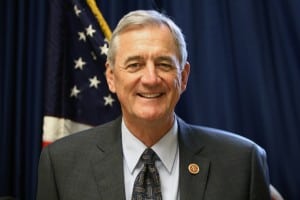
Congressman Rick Nolan, the DFLer who represents northeastern Minnesota, sent a letter to President Donald Trump last week, asking him to overturn protections for the Boundary Waters Canoe Area Wilderness that President Barack Obama put in place shortly before leaving office.
The move followed similar correspondence from Kurt Daudt, the GOP official who also asked the new president to let the Twin Metals mine move forward again. The Obama administration decided late last year to reject Twin Metals’ federal mineral leases near the Boundary Waters and initiate a process to withdraw federal lands that drain toward the wilderness from mining for 20 years.
Nolan’s argued that there is no official mining proposal in the region yet, so it is impossible to study hypothetical impacts. He also said the withdrawal met the standard for Trump’s Executive Order on January 20th freezing new federal regulations.
“We are all in agreement with the USDA’s mission to maintain water quality and to protect fish and wildlife. We must protect our environment,” Nolan said. “That being said, we should also never be afraid of exploration and discovery, or using science and facts to dictate important decisions.”
Nolan’s letter was criticized by many anti-mining DFLers, as well as another member of the party’s Congressional delegation from Minnesota. Rep. Betty McCollum, of St. Paul, blasted Nolan’s outreach to the White House.
“Particularly disturbing is that Representative Nolan thinks the Trump administration will make its decision using ‘science and facts,’ which puts an outrageous amount of faith in an administration that denies climate science and has openly peddled ‘alternative facts.’
This afternoon, about 100 people and the media gathered outside Nolan’s office in Duluth. Protestors said the edge of the Boundary Waters was the wrong place for copper-nickel mining, with its potential for water pollution. Mines could actually negatively affect the region’s economy, wilderness outfitter Jason Zabokrtsky told the Duluth News Tribune.
“This is the most toxic industry in America and they want to put it on the edge of the most visited wilderness area in America,’’ Zabokrtsky said. “I’m not anti-mining. But this is the wrong place to do this kind of mining.”
Nolan was one of the sponsors of the 1978 Boundary Waters Act, which codified compromises over issues such as motor use, logging, and resorts. It also established a narrow Mining Protection Zone around the edge of the wilderness and in corridors like the Fernberg Road and Gunflint Trail.

